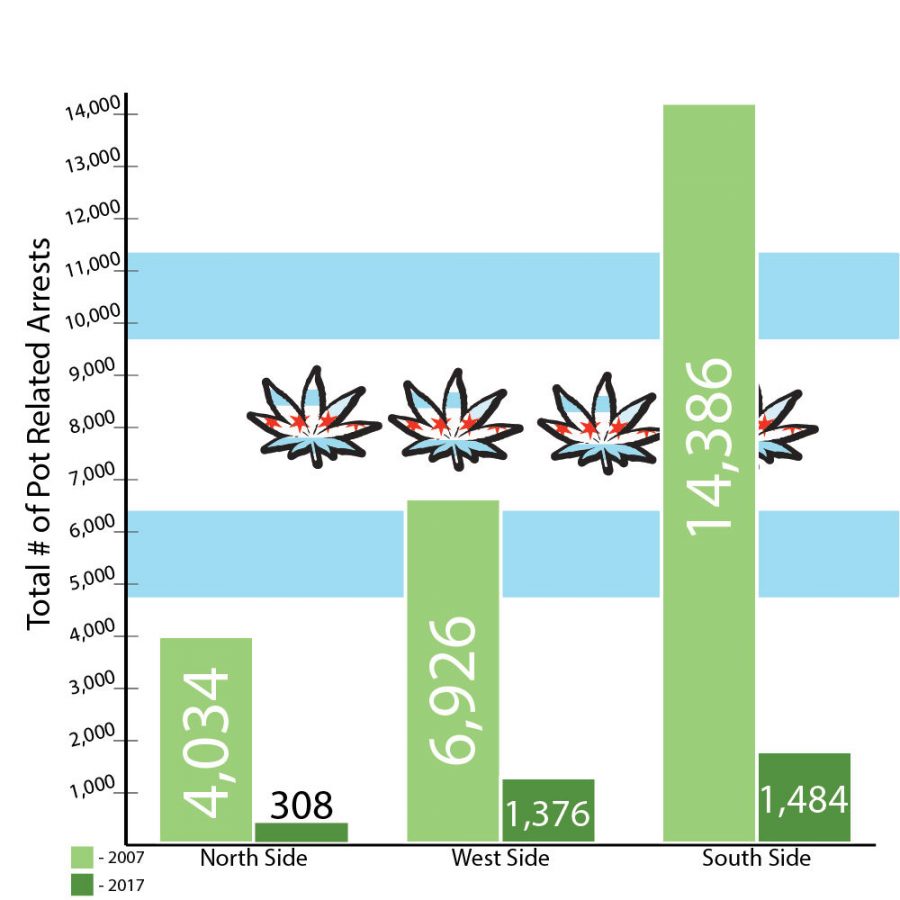Decriminalization may be road to legalization in Illinois
Decriminalization may be road to legalization in Illinois
February 19, 2018
Chicago police made fewer than 3,200 marijuana-related arrests in 2017—the lowest number since 1968, according to an analysis of Chicago Police Department data.
While Illinois has made steady progress decriminalizing marijuana and has legalized it for medical use, the state has yet to follow nine others that have cleared the path for recreational use.
Since July 2017, Illinois law has determined the possession of up to 10 grams of cannabis carries only a civil penalty punishable by a maximum $200 fine.
However, decriminalization does not address the historical problem with prohibition as an ineffective deterrent because a large percent of the population continue to use marijuana, whether it is legal or not, said Chris Lindsey, senior legislative council for the Marijuana Policy Project, a national organization for cannabis policy reform.
State Sen. Heather Steans, D-Chicago, and state Rep. Kelly Cassidy, D-Chicago, introduced Senate Bill 316 and House Bill 2353, respectively, in March 2017 to legalize the sale of adult-use cannabis and create necessary regulations and taxation.
“Steans and Cassidy are both mothers with teenage children,” said Rose Ashby, the legislators’ field director. “Their goal is public safety. They are not pro-[marijuana], they are anti-prohibition.”
Since the bills were introduced, Steans and Cassidy have held public hearings about the economic development, public safety and the public health implications of recreational cannabis, Ashby said.
The legislation would allow Illinois residents over the age of 21 to possess up to 28 grams of cannabis and own up to five cannabis plants. It would also create a tax structure that encourages competition and diverts users from the black market, according to state legislative records.
“Right now, all the money being spent on marijuana is going into the pockets of criminals and cartels,” Steans said in a press release. “In a regulated system, the money would go to licensed, tax-paying businesses, and generate hundreds of millions of dollars per year in revenue for our state.”
Not everyone is sold on the proposal, however. Kevin Sabet, president of a national group called Smart Approaches to Marijuana, has been advocating against legalization in Illinois.
Sabet argues that recreational marijuana will create an industry similar to Big Tobacco. Because alcohol and tobacco taxes have not generated enough state revenue, recreational marijuana profit as a solution to revenue issues is a false promise and bogus argument, Sabet said.
However, twelve percent of state revenues come from taxes on cigarettes, liquor and insurance, totaling $3.9 billion in 2017, according to data from the Governor’s Office of Management and Budget.
Under the proposed legislation, all products would be tested for potency and businesses would be required to print label warnings. Consuming cannabis in public or while driving would remain illegal.
“We can fix the social justice issues with our laws without legalizing marijuana,” Sabet said. “But with legalization we get a lot more than what we bargained for and a new industry that pushes products, candies, edibles in a way that the tobacco industry did. Why would we want to legitimize another tobacco industry? We should focus on awareness and education about this very misunderstood drug.”
In a 2017 survey by the National Survey on Drug Use and Health, 750,000 Illinois adults reported that they had used cannabis within the past month. However, only 25,600 individuals are registered with the state’s medical cannabis program.
Lindsey said Illinois has an advantage with the existing, highly regulated medical cannabis program.
“That system can be leveraged for the adult non-medical market, so instead of serving 25,000 patients across the state, they could be serving the hundreds of thousands of people who are regular marijuana consumers who get all of their cannabis from criminal organizations,” he said.
Medical marijuana was legal in 19 other states before state law allowed it in Illinois in 2013. Nine states and D.C. have gone beyond decriminalization and medicinal cannabis by legalizing recreational marijuana. While Illinois has held back from making a decision, legislators have spoken with other states about their programs.
But it is important that Illinois consider what will be best for the state, Lindsey said.
“The Illinois form of legalization will not look like Colorado’s,” he said. “Illinois will be uniquely Illinois and will be based on its own program, experiences and what it prefers.”








